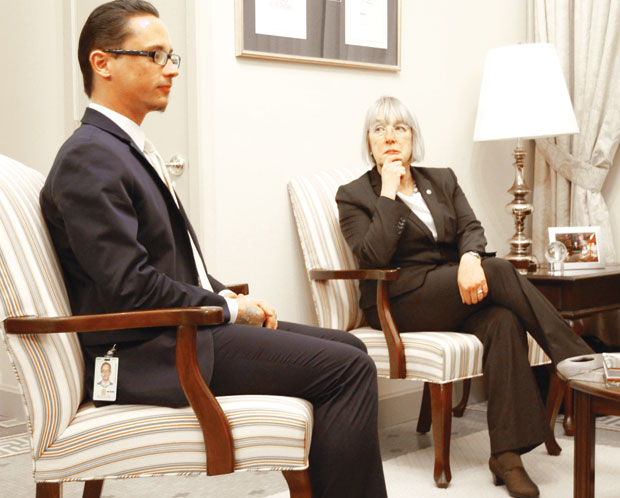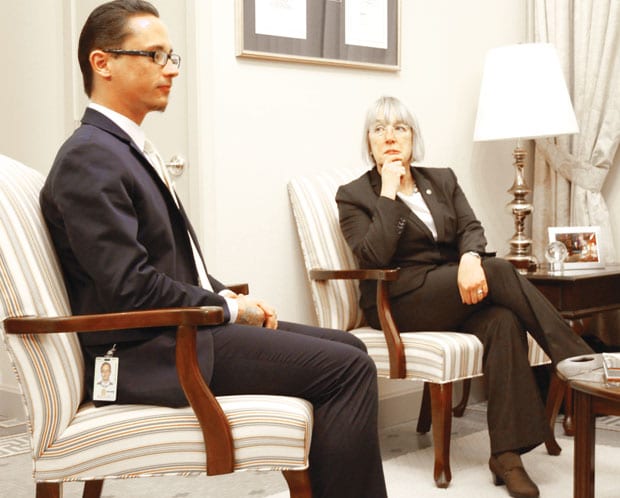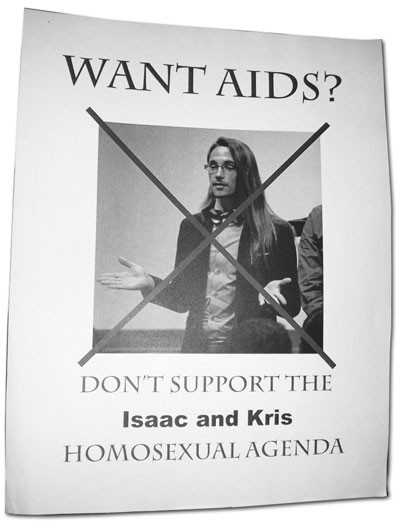Kristopher Sharp’s harassment at UHD last year pushed Sen. Murray to introduce the bill this week, push for a vote this time around

DESTINED TO LEAD | University of Houston-Downtown senior Kristopher Sharp sits with Sen. Patty Murray, D-Wash., in her Washington, D.C., office this week. Sharp is an intern in her office and is using his anti-gay bullying experience at UHD to gain support for a collegiate anti-harassment bill introduced by Murray. (Courtesy of Kathryn Robertson/Sen. Patty Murray’s office)
WASHINGTON — When Kristopher Sharp was called into his dean’s office last year and shown a flier targeting his sexual orientation and HIV status in his campaign for student body vice president, he never thought the experience would lead to a bill to prevent future attacks.
Sharp, now a senior at the University of Houston-Downtown, is an intern in the Washington, D.C., office of Sen. Patty Murray, D-Wash., as part of the Gay and Lesbian Victory Fund’s congressional internship program. His personal story of anti-gay and HIV harassment inspired Murray and out Sen. Tammy Baldwin, D-Wisc., to introduce the Tyler Clementi Higher Education Anti-Harassment Act of 2014 on Thursday.
The bill was originally sponsored by the late Sen. Frank Lautenberg, D-N.J., and is named for the Rutgers University student who committed suicide in 2010 after his roommate streamed a video of Clementi and another man having sex. The LGBT-inclusive bill would require colleges and universities to prohibit harassment and establish a Department of Education grant program to support campus anti-harassment programs.
Last March, Sharp was called in to speak to administrators about a flier circulated around campus with a picture of him with an X over it below the caption, “WANT AIDS?” It urged students not to support him and his running mate’s “homosexual agenda.” On the back of the flier was a copy of a medical document confirming his HIV-positive status. Dallas Voice first reported the homophobic attacks.
Sharp said this week that Murray’s office was considering taking up the bill. He mentioned his story during a policy meeting a few weeks ago and later shared it with the senator, who then decided to introduce it.
“It’s kind of crazy to even be placed in Sen. Murray’s office knowing this is a bill she was looking at,” Sharp said. “It just seems way too destined. This is the perfect example of why we need legislation like this.”
Murray agreed.
“When Kris came to intern for me and came in and told me what had happened to him personally, it just crystallized for me how important this is,” Murray said.
“And Kris’ courage in not just letting something bad happen to him, but really want to make a difference so this won’t happen to anybody else is so compelling.”
At the time, UHD officials told Dallas Voice they were launching an investigation into the incident, but Sharp was told that little could be done. The university never found who was responsible, and Sharp said he’s requested information about the situation through an open records request. The university fought the request, and the attorney general’s office sided with the university to withhold the records.
Murray said for a dean of students to offer little help in a situation of harassment for being gay or HIV-positive is unacceptable, and under the bill, the university would have been required to address the incident with more severity.
“When Kris told me his personal story, my thought is probably what most people’s are: This can’t happen in this country,” she said. “ To have the unthinkable like this occur and the dean of students, who is so powerful, looking down at a young person and saying ‘I can’t help you.’ Really?
“No young person, no matter who they are, should have to think about how this may happen to me before I go to college. Do they have a policy?” Murray added.
“In this country we need to send a strong message: If you go to a college or university, you know that there are protections in place for you.”
The original bill was never voted on in committee, but Murray said she expects it to gain momentum this time around with the powerful stories of Clementi’s and others like Sharp’s, which proves the bill is still needed.
“I can’t imagine how anybody would listen to Kris and say I can’t help you. And not just Kris, but anybody like him in the country,” Murray said. “Not everybody takes the time to sit down to listen to a story like Tyler’s or to listen personally to Kris or to even want to know that this happens, so it’s going to take a lot of work to get the word out about this.”
The incident greatly affected Sharp, who once thought about withdrawing from the race and contemplated suicide.
But he said support from the university and the greater LGBT community outweighed the negative pushback at the university.
“I did get depressed. I got really sad, and there were even a couple of moments where I was like I can’t do life anymore,” he said. “If it wasn’t for the support of the community … these people who were being kind to me, I don’t think I’d be here today.”
He later used his role to open an LGBT resource center in the fall and add sexual orientation and gender identity to the nondiscrimination policy in the student handbook.
Now he hopes to use his painful story and his role as an intern to support the bill to passage.
“If this bill were to pass and somehow I were able to help that, help the senator push it or testify on its behalf, if it were to pass, it would almost be worth it,”
Sharp said. “It was a very difficult time, of course, in my life, but to know that there are protections in place for all students because of something like that is very meaningful. This specific example exemplifies why we need polices like this to be put in place.”
This article appeared in the Dallas Voice print edition March 28, 2014.


